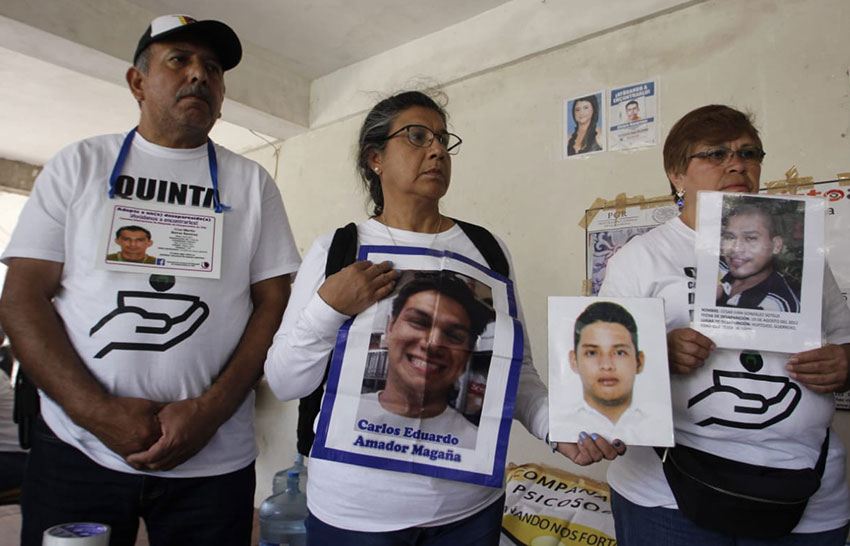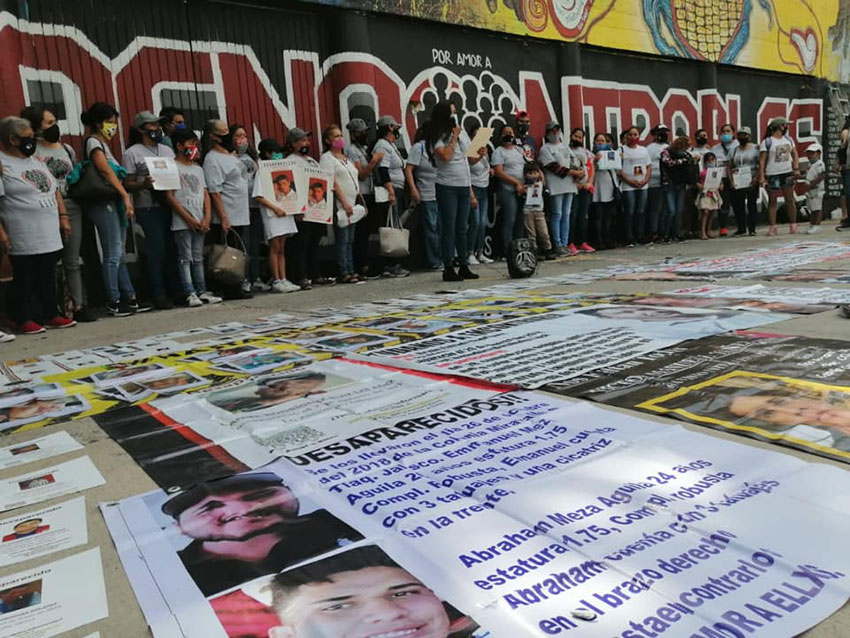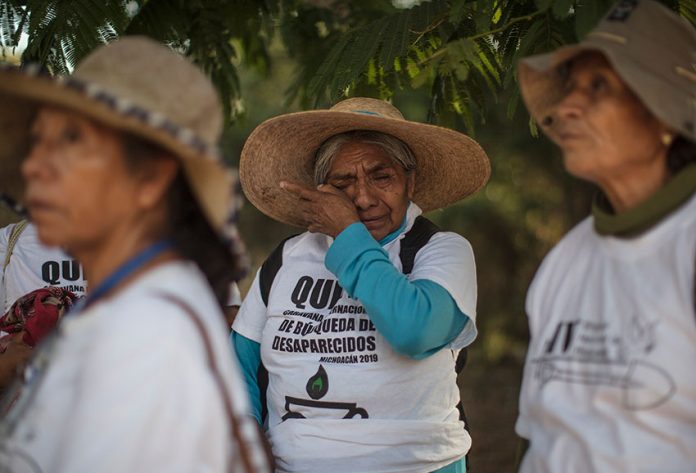Family members of Jalisco’s disappeared gather inside Guadalajara Cathedral. Some carry white roses. Others clutch photos of their missing loved ones. A priest solemnly reads the names of men, women and children who have gone missing in the state in recent years.
In the street outside, activists tie white ribbons to a fence, each one bearing the name of a missing person. They light candles and call for justice. A women shouts into a megaphone:
“We are not two. We are not three. We are not four. We are not five. We are 10,000 people disappeared in the state of Jalisco. Wake up. Wake up, Jalisco …”
To mark International Day of the Disappeared on August 30, families of the missing in Jalisco and other states took part in protests and online campaigns to draw attention to the burgeoning human rights crisis.
They criticized the state’s failure to investigate the disappearances and to protect its citizens.
According to Karla Quintana Osuna, the head of the National Search Commission, there were 73,200 people missing in Mexico as of July.
Jalisco has the second-highest number of disappearances in the country – approximately 13% of cases nationally. Between June 1, 1995 and July 31, 2020, some 9,341 people disappeared without being found, according to the state’s Institute of Statistical and Geographical Information.
Miguel Ángel Chávez Cárdenas, a lawyer, is one of them.
His sister, Esperanza Chávez Cárdenas, is a member of Por Amor a Ellxs (For the Love of Them), one of many collectives formed of family members of the disappeared. She has been searching for her brother for six long years.
She told Mexico News Daily that the 54-year-old Chávez had disappeared without a trace on May 16, 2014.
On that day, the family had been celebrating the birthday of Chávez’s youngest son. They went to his sister’s house in Guadalajara to pick up a cake and a piñata to take to a restaurant. Chávez left the house before the others. But he never arrived at the party.

“We left just behind him and we passed the place where [the police] think he disappeared. I passed there, but I didn’t see anything. It all happened so quickly. It’s been six years now and we don’t know anything about what happened to him because the prosecutor is not investigating,” said Esperanza Chávez.
She and other members of Por Amor a Ellxs are frustrated by and critical of what they call is the lack of action by Jalisco’s Special Prosecutor for Disappeared Persons. Created in 2017, the office was supposed to improve radically the investigation of disappearances.
But Chávez said that little has changed. “They are obstructing [the families]. They don’t want to give us copies [of evidence] and you can’t visit without an appointment. I feel they are treating the families very badly.”
She said that she herself had not been mistreated, but she gave many examples of families who had been victimized.
“The public prosecutor publicly announced that a women [who had gone missing] was a drug dealer. Can you believe this? It should have been kept private. I believe that other states are the same, like Guanajuato and many other places. They’re all bad, but we cannot allow [the authorities] to victimize us in this way.”
In another case, Chávez said a man who had been kidnapped from his home was later found alive but traumatized in a drug treatment center, even though he was not an addict. Despite evidence that he had been abducted, the police closed the case. The family was left without answers or legal recourse.
Nonetheless, Por Amor a Ellxs has some trust in Jalisco’s State Search Commission.
Such commissions have been set up in most of Mexico’s states following the creation of the 2017 general law of disappearances, which was drawn up after pressure from families of the disappeared.
Chávez said the commission had successfully initiated searches leading to the discovery of missing persons. And although it does not have the power to prosecute, the commission does coordinate with and provide evidence to the public prosecutor’s office.
However, Barbara Frey, director of the Human Rights Program at the University of Minnesota and an expert on human rights in Mexico, explained that state search commissions “vary in effectiveness, are under-resourced” and lack the expertise to investigate complex cases, which many of them are.
In Michoacán, families of missing persons have had negative experiences of the state’s new search commission, for example.
Laura Orozco Medina, a member of the collective Familiares Caminando por Justicia (Families Walking for Justice), said, “We have many criticisms. At this time, it is not clear what actions the commissioner is taking to address disappearances in the state.”

Orozco is searching for her two brothers and her father.
Between 2008 and 2010, her brothers Leonel and Moisés and her father Leonel were allegedly forcibly disappeared by the now defunct Federal Investigations Agency (AFI) and members of the municipal police.
In addition, Orozco’s brother, José Iván, who had been falsely accused of a drug charge in 2007, was jailed for five years before being acquitted in 2012. Also a member of Familiares Caminando por Justicia, he was shot dead by two men in 2018.
The family, who lived in the small rural community of Nuevo Zirosto in western Michoacán, were targeted for extortion for their avocado orchards. Laura Orozco alleged that forced disappearances in Michoacán are being carried out by the state to create fear, occupy land and steal resources.
Describing life before they were targeted, she said: “We were a farming family and we dedicated ourselves to the cultivation and production of avocados. We were a very close, happy family. We were a normal family, like any other.”
Speaking about her own case and the experience of other members of Familiares Caminando por Justicia, Orozco said: “Everything has changed for all the members of the group, not just for me. The life plans of each member has been broken.
“In addition, the psychosocial impact of these serious human rights violations has been harsh. It is not something that ever leaves you. It is something that continues to exist. Although you learn to live with it, this does not mean it is ever over.”
The lack of action on behalf on the authorities has meant that groups such as of Por Amor a Ellxs and Familiares Caminado por Justicia have had to lobby for adequate laws. Today their work includes organizing search caravans, participating in forums, and creating visibility for the victims of disappearances and their families through art, performances and protests.
However, change is frustrated by high levels of impunity and the lack of political will.
“We have institutions, but there is still the same impunity. We have laws, but they are not applied.”
She added, “As long as the country is unwilling to investigate the cases, the chains of command, and the criminal and drug networks that are embedded in serious human rights violations, [Mexico] is not going to move forward.”
Mexico News Daily
